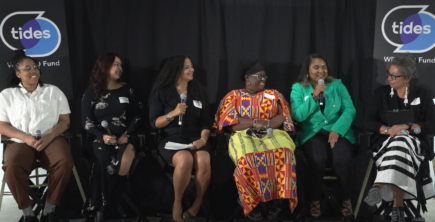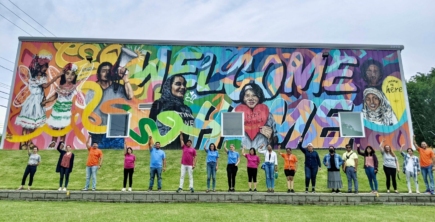
Crisis Response Fund

As nonprofit and philanthropic leaders, our ability to solve society’s toughest challenges depends on our capacity to work together. To succeed, we must prioritize building trust across our sector and the communities we serve. Trust enables us to better understand problems, build resilience, lead with agility, mobilize resources, and ultimately accelerate the pace of social change. Finally, trust is a unique resource—it grows rather than depletes through use, allowing us greater potential to shape our future.1
Findings from diverse sources such as Google’s Project Aristotle and network-building experts like Converge have shed light into the ways that trust impacts how well groups work together. A 2017 study funded by the William and Flora Hewlett Foundation examines how U.S. foundations access and use knowledge to inform their work. The findings show that grantmakers put the most trust in their peers and colleagues for practical information, looking to them for advice and knowledge more often than grantees and consultants. In addition, they consider in-person discussions to be more helpful than publications.2 Ultimately, foundation staff prize discretion, confidentiality, and the ability to access relevant knowledge quickly.
Trust is a unique resource—it grows rather than depletes through use, allowing us greater potential to shape our future.
This research highlights the general importance of credibility and conversations for solving problems. However, it also raises concerns about efficacy and opportunity costs. Foundation staff need diverse perspectives to address complex problems. By pursuing deeper trust with others, funders are able to engage more openly in valuable conversations, and leverage their partners’ unique expertise to make informed decisions together.
From experience, nonprofits also have significant room to grow their trust networks. While many teams agree that trust is important, when pressured to use limited resources, they prioritize what feels urgent—typically fundraising and program delivery.
It is not uncommon for organization leaders to:
The state of trust in the social impact field can be attributed to both history and present-day politics. The federal tax code both incentivizes and regulates charitable giving, which enables donors to influence issues through funding.3 Philanthropy has borrowed frameworks and vocabulary from academia and business that fail to acknowledge the complexity of social challenges.4 In addition, funders have traditionally focused on financing individual organizations and solutions, versus investing in collaborative approaches. Furthermore, numerous foundations and nonprofits have failed to integrate community voices into their interventions,5 resulting in marginally effective ‘band-aid’ solutions to systemic problems.
Social impact organizations remain susceptible to the same intersectional inequalities that they’re fighting against.
Perhaps most importantly, social impact organizations remain susceptible to the same intersectional inequalities that they’re fighting against. Despite best intentions, many organizations have failed to correct for systemic barriers that perpetuate discrimination. Implicit bias and false assumptions erode trust within the field—the persistent racial leadership gap in foundations and nonprofits exemplifies this.6
All of these issues are compounded by the urgency of our polarized social and political environment, making the work of social sector organizations even more imperative and difficult.7
Breaking the trust barrier is only possible by reaching beyond familiar circles and building strong relationships with unlikely partners. These challenges represent an immense opportunity for the field of social impact to catalyze large-scale change.
While every organization has unique needs and approaches, there are a few key elements to a successful trust-building strategy:
Core Ingredients
Framework
We can all learn from the strong examples set by the Whitman Institute, Social Transformation Project, Conveners.org, Converge, and Unicorns Unite, among many others.
For our part, Tides has doubled-down on the design and facilitation of collaborative initiatives to support foundations, nonprofits, corporations, and others. We co-create strategies and frameworks to help groups transform their understanding of problems to build powerful solutions for the future. Trust is at the heart of our approach.
Asking our partners to let us into their offices, their shelters, and the courtroom with their clients required months of intentional care and mutual respect. Taking risks to explore solutions together was a secondary objective.
This approach is exemplified by our Immigrants United Collaborative (IUC). At Tides we have convened three groups of unlikely partners—immigration nonprofits, technology and data experts, and philanthropic funders—into the IUC. This initiative is the first of its kind to design field solutions with, and for, immigration sector leaders. These entities have traditionally worked in silos, and this effort is specifically designed to give all three stakeholders an equal seat at the table.
This work would not be possible without a deep focus on trust and relationship development at both the one:one and one:many levels. Human lives are at risk on a daily basis, and organizations on the ground are regularly in a defensive and reactive mode. Asking our partners to let us into their offices, their shelters, and the courtroom with their clients required months of intentional care and mutual respect. Taking risks to explore solutions together was a secondary objective.
As we continue to grow our work through initiatives like the Immigrants United Collaborative, we continue to seek organizations with whom we can learn and partner with across the field—please don’t hesitate to reach out.

Crisis Response Fund

WE LEAD

Equality & Human Rights

Read the stories and hear the voices of social change leaders fighting for justice.